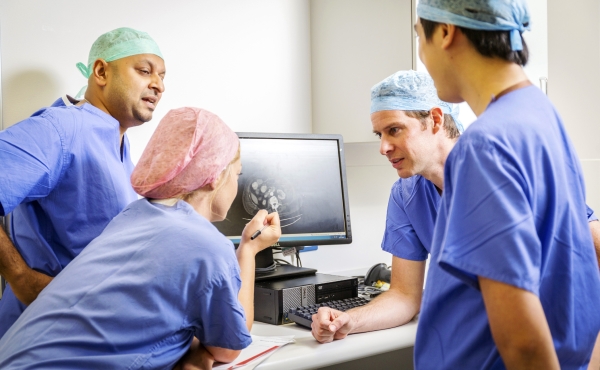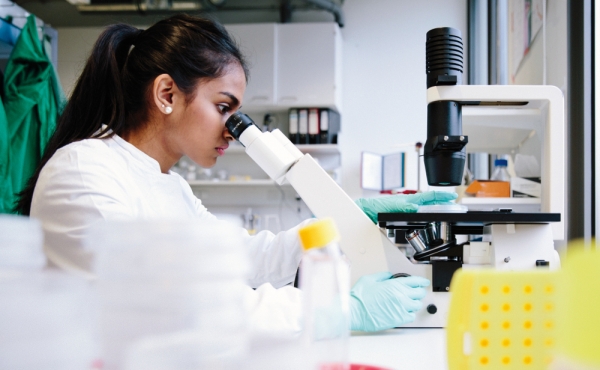Perioperative Medicine Clinical Trials Network
POMCTN supports the delivery of large scale perioperative trials in the UK
The UK Perioperative Medicine Clinical Trials Network (POMCTN) aims to create an environment which allows everyone with an interest in perioperative care to make a meaningful but realistic contribution to clinical trials and observational studies.

The UK Perioperative Medicine Clinical Trials Network (POMCTN or CTN) creates working relationships between trial organisers and investigators in individual hospitals, creating recognisable roles for every member of the group, even though POMCTN projects are usually large collaborations. The aim is to promote engagement with clinical trials and early implementation of the findings.
Overseen by the RCoA Centre for Research and Improvement (CR&I), the POMCTN supports research projects involving the recruitment of patients where the aim is to improve outcomes following surgical treatment. This does not include research into surgical techniques except where these overlap with perioperative medicine. Our focus is on large clinical trials but some smaller studies will be appropriate for POMCTN support, especially if these are likely to translate into subsequent larger trials.
Register as an Investigator
POMCTN currently offers four registration schemes for prospective researchers, which you can sign up for via the POMCTN website. Registration is free.
-
Research Leaders Scheme
The aim of the CTN Research Leaders scheme is designed for a very small number of leaders of future clinical research, around five at any one time, who are individually selected at competitive interview from amongst existing members of both the Local and Principal Investigator scheme. The Research Leaders (RL) scheme will necessarily be based on prior research experience, including recruitment of patients to research as a trainee, and undertaking the roles of local investigator, local principal investigator and grant co-applicant.We are currently recruiting new Research Leaders for 2025. For more information and to apply, click here: Research Leaders Scheme
- Associate Investigator
The aim of the Associate scheme is to connect researchers, who are unlikely to be active in patient recruitment, to the members within the CTN. This is done by being kept informed about upcoming events and engaging in CTN activities. - Local Investigator
The Local Investigator scheme is develops and supports individuals at local centres, to equip them with the training and skills to be co-investigators or trainee investigators in multicentre research trials. -
Principal Investigator
The aim of the Principal Investigator scheme is to develop and support individuals at local centres and to equip them with the training and skills to be local Principal Investigators for multi-centre research trials.
Applicants will be able to select which scheme they wish to apply for at the time of registration, with the exception of the Chief Investigator Scheme, which is recruited to annually.
POMCTN expect most members of the Principal Investigator (PI) scheme to be consultant level; unless you expect to be eligible to act as a Principal Investigator on most POMCTN studies, you should apply for the Local Investigator scheme. This does not preclude acting as PI for individual studies.
Investigator applications are reviewed by CTN administration staff and Board members.
Participate in a POMCTN study
POMCTN aims to promote, support, design, and conduct multicentre collaborative research in anaesthesia, perioperative medicine, and pain medicine. To that end, investigators can submit their clinical trials for adoption by the Network, review by its Board and other members, and promotion to aid patient recruitment.
Click the links below for more on currently ongoing POMCTN studies:
POMCTN-led trials
Volatile vs Total intravenous Anaesthesia for major non-cardiac surgery: A pragmatic randomised trial - VITAL
VITAL is a clinical trial to test whether total intravenous anaesthesia (TIVA) is better than inhalational anaesthesia for patients undergoing major non-cardiac surgery in the NHS. The two main anaesthetic techniques are inhalational anaesthesia (patient inhales volatile anaesthetic gases) and TIVA (patient receives intravenous infusion of anaesthetic drug). Inhalational anaesthesia is historically more popular, but many anaesthetists are changing to TIVA on the basis of low-quality data on cancer recurrence and greenhouse gas effects. The VITAL trial will provide robust generalisable data comparing each technique in terms of patient recovery, survival and safety. VITAL will test whether TIVA is superior to inhalational anaesthesia in terms of days alive and at home at 30 days (DAH30), survival and quality of recovery amongst patients undergoing major non-cardiac surgery. VITAL will also evaluate the safety of TIVA, in particular accidental awareness under anaesthesia and assess the cost-effectiveness of TIVA. We have partnered with the Perioperative Quality Improvement Programme (PQIP), a large national cohort study recruiting patients undergoing major non-cardiac surgery. VITAL will use the PQIP data collection procedures to maximise efficiency and reduce research burden. VITAL will look to recruit 2500 patients undergoing major non-cardiac surgery in 40 NHS hospitals. As well as clinical outcomes, VITAL will include a SWAT(Study Within A Trial): Rapid qualitative study of patient consent to examine ways of co-recruiting and consenting patients to complementary studies and explore patient, carer and staff views and experiences with different recruitment approaches.
VITAL is funded by NIHR-HTA and has a website containing more information:
https:warwick.ac.uk/fac/sci/med/research/ctu/trials/vital/
CAMELOT - Continuous rectus sheath Analgesia in eMErgency LaparOTomy
In the UK around 30,000 patients a year undergo an operation called an emergency laparotomy to treat life-threatening conditions. A large vertical cut is made in the abdomen when patients are asleep under general anaesthesia. Good pain relief after surgery will help patients feel better and recover quicker. Rectus sheath catheters (RSCs) are a new way of providing pain relief, where two thin tubes (catheters) are inserted on either side of the wound during the operation. Local anaesthetic is injected slowly into the catheters to numb the nerves and reduce pain for about three days. CAMELOT study will find out whether adding RSCs to standard morphine patient-controlled analgesia (PCA) provides better pain relief, fewer side effects and complications, and greater satisfaction for patients undergoing emergency laparotomy. It will also determine whether they are safe and cost-effective. We will assess the effectiveness of pain using the Overall Benefit of Analgesia Score (OBAS) which will include pain scores, side effects and patient satisfaction. We will also compare the speed of patients’ recovery from surgery and look for relevant complications such as breathing problems. We will check for long-term pain six months after surgery, measure NHS costs and impact on patients’ return to activities.
CAMELOT is funded by NIHR-HTA.
Sugammadex for preventIoN oF pOst-operative pulmoNary complIcAtions SINFONIA
Neuromuscular blocking drugs, when not fully reversed at the end of surgery, lead to weakness of respiratory muscles and airway reflexes, and are associated with post-operative pulmonary complications (PPCs) such as pneumonia. Incomplete reversal of neuromuscular blockade remains extremely common despite improvements in neuromuscular monitoring.
Neostigmine has been used for over 50 years but often provides sub-optimal reversal and is itself associated with dose-dependent muscle weakness and impaired lung function. Compared to neostigmine, the newer drug, Sugammadex reverses NMBAs more rapidly and reliably, reducing the incidence of residual muscle weakness after surgery.
PPCs, ranging from atelectasis to pneumonia and ARDS, occur in over 200,000 patients each year in the NHS, resulting in prolonged hospital stay, ITU admissions, and higher mortality. Some evidence suggests that Sugammadex may reduce the likelihood of PPCs compared to Neostigmine and thus improve patient recovery, however this has not been proven. In addition, in Japan, where Sugammadex has been widely used for over 10 years, Sugammadex is now the most common cause of perioperative anaphylaxis, and it is possible that this will also occur in the UK.
SINFONIA is a pragmatic multi-centre randomised trial in patients aged at least 50 years who are undergoing major thoracic or abdominal surgery, and will generate robust data on the risks and benefits of the two alternative drugs. Patients will be randomly assigned to sugammadex or neostigmine and followed up to detect patient-centred outcomes. The primary outcome is Days Alive and out of Hospital within 30 days after surgery (DAH30), with secondary outcomes of quality of recovery from anaesthesia, PPCs, mortality, health-related quality of life and cost effectiveness.
We hope to recruit 2500 patients across 40 NHS hospitals. In a few centres with specialist allergy clinics, we will carry out a substudy to investigate the rate of allergic sensitisation to Sugammadex.
SINFONIA is funded by the NIHR HTA programme (NIHR133056).
POMCTN Adopted Studies
A placebo-controlled rAndomised trial of intravenous Lidocaine in acceLErating Gastrointestinal Recovery after cOlorectal surgery (ALLEGRO)
ALLEGRO aims to be the definitive trial to test whether 6-12 hours of perioperative IV lidocaine accelerates return of GI function after colorectal resection in the NHS. The primary study is powered to test the primary hypothesis in laparoscopic segmental colectomy and will recruit 562 patients from 12-15 hospitals over 3 years. We will also test the intervention in a parallel feasibility trial in open segmental colectomy patients using adaptive analysis to assess recruitment and effect size.
The primary study outcome will be return of gut function at 72 hours after surgery defined by a validated composite endpoint. Secondary outcomes will include other patient-reported aspects of recovery; pain scores and analgesia consumption; length of stay; safety endpoints; and health economic analysis.
ALLEGRO is funded by NIHR-HTA and has a website containing more information.
Fluid Optimisation in Emergency Laparotomy (FLO-ELA)
FLO-ELA is an open-label, multicentre, randomised controlled trial of cardiac output-guided haemodynamic therapy compared to usual care in patients undergoing emergency bowel surgery. It is the largest and most ambitious trial adopted by the POMCTN. FLO-ELA is a large pragmatic trial to evaluate the clinical effectiveness of perioperative cardiac output guided haemodynamic therapy in patients aged 50 years and over undergoing major emergency bowel surgery. We will compare this treatment to usual clinical care in 7646 patients across 100 UK hospitals.
FLO-ELA aims to recruit 7646 patients aged ≥50 years undergoing emergency laparotomy over 3 years, to confirm the clinical effectiveness of cardiac output-guided fluid therapy.
Nearly 50 hospitals have volunteered so far, many with POMCTN registered principal investigators, but we urgently need more hospitals to take part.
The trial is extremely simple with all the patient follow-up completed through the National Emergency Laparotomy Audit. Cardiac monitors and consumables will be provided. Trainees anaesthetists will play a vital role in FLO-ELA as many of the key additional tasks can be completed during the course of emergency theatre lists.
Find out more at www.floela.org and encourage your department to take part.
Effectiveness and cost-effectiveness of INSPIRatory musclE training (IMT) for reducing postoperative pulmonary complications (PPC): a sham-controlled randomised controlled trial (RCT) (INSPIRE)
After major operations, some patients develop complications of the lungs, including pneumonia. These complications can be serious and may result in long stays in hospital, admission to intensive care and even death. They also prolong recovery from surgery and reduce patients’ quality of life. In the long term, lung complications increase the risk of poor health and even death for up to ten years after surgery.
Poor health due to lung complications also increases healthcare costs. Lung complications are common, affecting on average one in ten patients, with the risk for a particular individual depending on their current health and the type of surgery they are having. Consequently, trying to prevent lung complications is important for patients and the National Health Service (NHS).
The main aim of the study is to compare the number of lung complications between the three groups in the first 30 days after surgery. We will record all lung complications that develop in hospital whilst patients are recovering from surgery and also any hospital admissions for a lung complication after patients are discharged from hospital following their operation. We will also compare the time patients spend in hospital, their quality of life after their operation and survival. The costs of any treatment received and time spent in hospital will also be compared between groups.
This trial is a prospective sham controlled randomised controlled trial to evaluate the effectiveness and cost-effectiveness of inspiratory muscle training (IMT) to reduce post operative pulmonary complications before major abdominal and cardiothoracic surgery.
Melatonin for Anxiety prior to General anaesthesia In Children (MAGIC)
Our first paediatric trial, MAGIC will be conducted in eight large NHS trusts (Sheffield, Barnsley, Leeds, Manchester, Liverpool, Aberdeen, Durham and Stoke) and aims to recruit between 21 and 180 participants per centre over an 18 month period. This study is to establish comparative effectiveness and side effect profile of melatonin versus midazolam as premedication in children aged 6-12 with high levels of preoperative distress prior to elective GA for dental extractions & ENT operations, and to determine whether melatonin offers sufficient benefit to warrant change in standard NHS practice.
MAGIC is a clinical trial of a medicinal product (CTIMP) so the trial paperwork and procedures are a little more stringent than some other trials and observational studies. For this reason, the trial is best led locally by a consultant who can play an active role. Your local R&D department will be able to guide you through the process. Please contact us if you would like us to connect you with the trial team.
Dental extractions and tonsillectomies compose the two most common operations for children undergoing general anaesthesia in the UK, accounting for 60,000 and 34,000 operations per year, respectively. Anxiety ahead of general anaesthesia is common, with up to 50% of children displaying manifestations of distress-behaviour at the point of anaesthetic induction. Anxiety and distress in a child may lead to non-compliance and result in rescheduling of elective surgery; it may furthermore lead to greater post-operative pain, agitation and behavioural changes after surgery including sleep disturbances.
Midazolam, the current standard premedication given to an anxious child ahead of surgery has been shown to be effective, although there are numerous adverse effects which make the medication less than ideal. One major consequence of benzodiazepine drugs such as midazolam is a sedative effect, which necessitates theatre transfer of the premedicated child, and also significantly delays post-operative recovery.
Further concerns include the potential for respiratory suppression and also unpredictable effects on children which may result in agitation rather than anxiolysis. The increased incidence of learning disabilities with repeated anaesthetic exposure has been documented in a landmark study by Wilder et al., which highlighted the potential long-term risks of using sedative agents such as benzodiazepines in anaesthesia of young children.
Optimisation of Perioperative Cardiovascular Management to Improve Surgical Outcome II (OPTIMISE II) Trial
Open, multi-centre, randomised controlled trial of cardiac output-guided fluid therapy with low dose inotrope infusion compared to usual care in patients undergoing major elective gastrointestinal surgery.
OPTIMISE II is a definitive large trial to evaluate the clinical effectiveness of peri-operative cardiac output guided haemodynamic therapy in high-risk patients aged 65 years and over undergoing major elective gastrointestinal surgery. It will compare this treatment to usual clinical care in 2502 patients across 50 hospitals worldwide. We aim to recruit 2502 patients in 50 hospitals worldwide, but we can only complete the trial on time with a strong contribution from the NHS.
Recruiting hospitals is particularly difficult because so many anaesthetists have strong beliefs that this treatment approach either does or does not work. Whilst we may think we know what the outcome will be, none of us knows for sure. We will struggle to improve the care of our patients unless we support projects which resolve difficult treatment decisions.
The study’s primary objective is to establish whether the use of minimally invasive cardiac output monitoring to guide protocolised administration of intra-venous fluid, combined with low dose inotrope infusion, will reduce the number of patients who experience a hospital-acquired infection within 30 days following major elective surgery involving the gastro-intestinal tract.
The secondary objectives will determine whether cardiac output-guided haemodynamic therapy reduces mortality, other forms of postoperative morbidity, improves quality of life and is cost-effective.
Optimising Shared decision-makIng for high-RIsk major Surgery (OSIRIS)
Each year in the NHS, 250,000 high-risk patients undergo major surgery. High-risk patients are typically older with long-term disease. They often experience serious medical problems after surgery, such as pneumonia or heart attacks, causing a lasting decline in health and quality of life.
This can occur even if surgery and anaesthesia have gone smoothly. Older patients with long-term health problems have different hopes and expectations of medical treatments, but these may not be understood by doctors. As a result, high-risk patients may not receive the information they need when contemplating surgery. We want to help patients better understand their risks, and choose the treatments that best suit them, by improving how they decide about surgery with their doctors.
The over-arching aim of the OSIRIS programme is to improve shared decision making for 250,000 high-risk patients undergoing major surgery each year in the NHS. High-risk patients are typically older with long-term disease.
They often experience serious medical problems after surgery, such as pneumonia or heart attacks, causing a lasting decline in health and quality of life. Older patients with long-term health problems have different hopes and expectations of medical treatments, but these may not be understood by doctors.
As a result, high-risk patients may not receive the information they need when contemplating surgery. We plan an integrated programme of research to co-design a decision support intervention, utilising a computational risk model, to provide an accurate and individualised forecast of the risks and benefits of surgery for each high-risk patient.
The clinical and cost-effectiveness of ThOracic epidural vs Paravertebral blockade In Chronic post-thoracotomy pain: multi-centre randomised controlled trial (TOPIC-2)
The study will be a randomised, parallel group, open, multicentre study in up to 20 UK thoracic centres.
One of the top 10 research priorities in anaesthesia and perioperative care from the James Lind Alliance is “what can we do to stop patients developing chronic pain after surgery?” As thoracotomy is a procedure with a high incidence of chronic pain, this is a good model to use. There is clinical uncertainty in the use of anaesthetic blockades in thoracotomy, with great variation in national practice.
Two main anaesthetic blockades are in use for thoracotomy: Thoracic Epidural Blockade (TEB) and Paravertebral blockade (PVB). In 2015, a Cochrane Review found no randomised comparisons of TEB versus PVB focusing on the outcome of chronic pain and highlighted the need for further research and high quality data.
The overall aim of this research is to determine in adult patients who undergo open thoracotomy whether perioperative paravertebral blockade (PVB) at thoracotomy results in reduced chronic post-thoracotomy pain compared to thoracic epidural blockade (TEB). To answer this research question with authoritative evidence of clinical and cost effectiveness of PVB, a multi-centre randomised controlled trial with a parallel health economic evaluation is required. Following a successful pilot study, we are looking to roll out a larger randomised trial.
RESULT-Hip: The impact of Restrictive versus Liberal Transfusion strategy on cardiac injury in patients undergoing surgery for Hip Fracture
Anaemia is common in patients who have sustained a hip fracture, and 30-40% of these patients receive a blood transfusion before or after surgery. Many of these older patients also suffer cardiac complications after their hip fracture which affect morbidity and mortality: cardiac complications are more common in anaemic patients. Blood transfusions to optimise cardiac oxygen delivery may help to prevent cardiac complications and result in improved outcomes.
Result-Hip is a multicentre randomised controlled trial comparing the effect of two perioperative transfusion strategies on the incidence of death and cardiac injury (major adverse cardiac events, MACE) after emergency hip fracture surgery. We will recruit 1,964 patients who have become anaemic after presenting to hospital with a hip fracture. Half of these patients will be randomised to receive blood transfusion at a higher anaemia level, when the haemoglobin is 90g/L or less, and the others will receive blood transfusions when the haemoglobin measures 75g/L or less. The primary outcome is death and MACE within 30 days of surgery. The secondary outcomes include other complications, duration of hospital stay, quality of life, mobility, and economic health evaluation. We will compare outcomes between the groups in order to determine best management and guide how blood transfusions are given in the future.
More information about the study is available at https:edin.ac/result-hip.
Submit your own trial for adoption
The purpose of POMCTN adoption is to ensure excellence in study design, conduct, analysis and dissemination. Trial endorsement will provide the trial team access to the Network infrastructure, most importantly the membership of active local and principal investigators.
POMCTN supports research projects involving the recruitment of patients where the aim is to improve outcomes following surgical treatment. This does not usually include research into surgical techniques except where there is clear overlap with perioperative medicine. Our focus is on large clinical trials but smaller studies may be appropriate for POMCTN support, especially if these are likely to translate into subsequent larger trials.
The following conditions apply for the duration of an adopted trial and all predefined sub-studies:
- all POMCTN studies must be presented to the Network membership on at least one occasion prior to launch.
- the trial management group has the responsibility to obtain funding if not already secured and conduct the trial in accordance with POMCTN policies.
- all trials must be conducted to the highest professional standards, in compliance with codes of research conduct (Good Clinical Practice).
- the POMCTN must receive quarterly updates on trial progress and statistics.
Click here to complete and submit a POMCTN Study Proposal Form.
Do you want to shape the future of UK perioperative trials?
Register as a POMCTN investigator now via their website and submit your own clinical trial proposals for adoption.

Joyce is a an Associate Clinical Professor at University of Warwick and Honorary Consultant in critical care. Her research into the impact of anaesthesia on post-operative delirium in patients with hip fracture has been awarded a NIHR post- doctoral fellowship. Her current research focuses on the impact of anaesthesia on cognitive function, the elderly, patient outcomes and development of chronic pain post surgery.

Mark is an anaesthetist/perioperative physician and researcher at University Hospital Southampton. His clinical activities include anaesthesia for major adult surgery, preoperative assessment/optimisation and developing clinical services within perioperative medicine. He completed his higher degree in perioperative immunology and postoperative morbidity at University College London before moving to Southampton in 2013. He is now Chief Investigator of the NIHR-funded FLO-ELA (FLuid Optimisation in Emergency LAparotomy) trial, Deputy Chief Investigator of the OPTIMISE II trial and a collaborator on the GAP Gabapentin trial. Research support roles within Wessex include NIHR CRN Specialty Group Lead for Anaesthesia, Perioperative Medicine and Pain, and Wessex School of Anaesthesia academic training lead. He is an Honorary Senior Clinical Lecturer at the University of Southampton.


